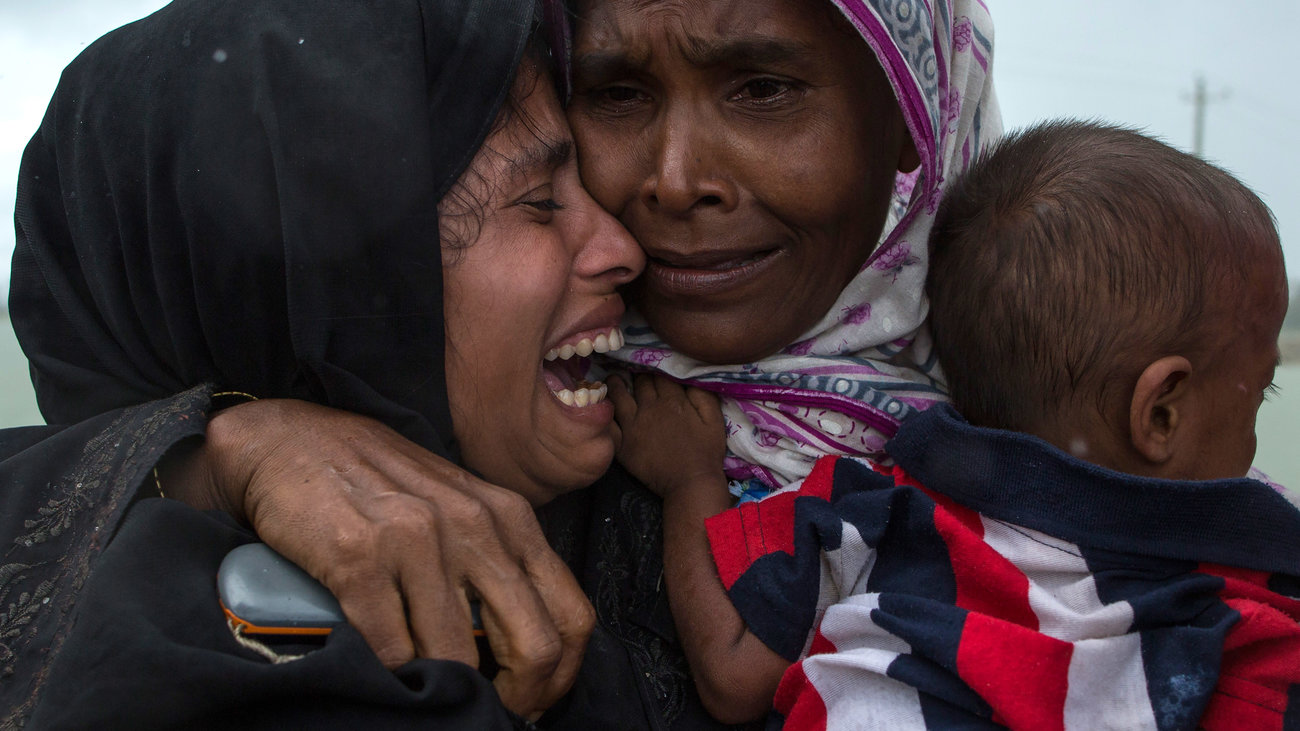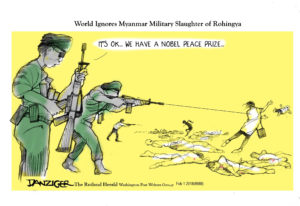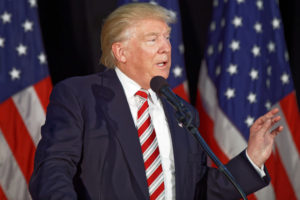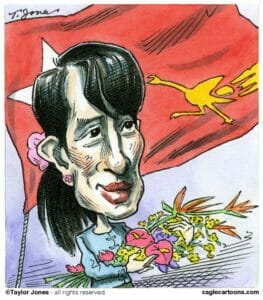Amnesty International: Ethnic Cleansing in Myanmar ‘Irrefutable’
The campaign to push the Rohingya, a Muslim ethnic minority, out of the country continues despite international condemnation. Rohingya refugees embrace one another, finally reunited after a perilous boat journey from Myanmar to Bangladesh. (Dan Kitwood / Getty Images)
Rohingya refugees embrace one another, finally reunited after a perilous boat journey from Myanmar to Bangladesh. (Dan Kitwood / Getty Images)
A press release from Amnesty International calls evidence of ethnic cleansing in Myanmar “irrefutable.” According to Tirana Hassan, the group’s crisis response director, “the Myanmar security forces are setting northern Rakhine State ablaze in a targeted campaign to push the Rohingya people out of Myanmar. Make no mistake: This is ethnic cleansing.
“There is a clear and systematic pattern of abuse here. Security forces surround a village, shoot people fleeing in panic and then torch houses to the ground. In legal terms, these are crimes against humanity—systematic attacks and forcible deportation of civilians,” Hassan said.
By the latest estimates, roughly 313,000 refugees have fled Myanmar across the border into Bangladesh in a span of just over two weeks. Hardship awaits the fleeing Rohingya, a Muslim ethnic minority in mostly Buddhist Myanmar: In Bangladesh, they find cramped, makeshift quarters built of bamboo and plastic sheeting, filled with humans and human misery, with few of their possessions.
The Rohingya say what they left behind was worse.
Reports of unbridled murder and arson, rape and persecution have followed them out of Myanmar’s western state of Rakhine, sketching a stark portrait of government violence. In an area largely barred from international observation, aid groups have been left to assemble a patchwork understanding of what’s unfolding—but by nearly all indications, it’s exceedingly grim.
“Because Myanmar has refused access to human rights investigators the current situation cannot yet be fully assessed,” Zeid Ra’ad Al Hussein, the United Nations high commissioner for human rights, said in a statement Monday, “but the situation seems a textbook example of ethnic cleansing.”
Hussein also said that since a militant group associated with the Rohingya attacked several military outposts Aug. 25, killing about a dozen people, the military has retaliated with excessive violence that is “clearly disproportionate and without regard for basic principles of international law.” He referred to reports that Myanmar authorities are turning away refugees until they can provide “proof of nationality,” which he calls “a cynical ploy to forcibly transfer large numbers of people,” given that the Rohingya are a Muslim minority group in majority-Buddhist Myanmar and are not recognized by the government as citizens.
The news has resulted in international action. Britain has caved in to increasing demands to halt its training of Myanmar soldiers. RT reports:
Prime Minister Theresa May said the Ministry of Defense (MoD) will “stop all defence engagement and training of the Burmese military” until it ends its security crackdown on the community.
Campaign Against Arms Trade (CAAT) spokesman Andrew Smith told RT last week that Britain must stop “legitimizing human rights abusers” and halt its training of Myanmar’s soldiers.
The decision comes after UN human rights chief Zeid Ra’ad al-Hussein called the military offensive against the Rohingyas a “textbook example of ethnic cleansing.”
At the United Nations conference in New York this week, May said, “We are very concerned about what’s happening to the Rohingya people in Burma. The military action against them must stop. We’ve seen too many vulnerable people having to flee for their lives. Aung San Suu Kyi and the Burmese government need to make it very clear that the military action should stop.”
May is one of many calling on Nobel Prize winner and Myanmar’s de facto leader Aung San Suu Kyi to speak out against the military. NPR writes:
For more than a week, the silence of Myanmar’s de facto civilian leader resonated loudly. Aung San Suu Kyi, the 1991 Nobel Peace Prize winner for her long struggle for democracy in Myanmar, does not control the military apparatus of the country. But many in the international community expected her to speak out publicly against the violence that had captured the world’s attention.
Then, last week, her office released a statement on Facebook, decrying the “huge iceberg of misinformation” by the Rohingya “terrorists.”
The statement posted to Facebook said the government “had already started defending all the people in Rakhine in the best way possible and expressed that there should be no misinformation to create trouble between the two countries.” It referred to “fake news photographs” posted on Twitter by Turkey’s deputy prime minister, which were intended to show dead Rohingya in Myanmar but some of which were actually taken elsewhere.
“That kind of fake information … was simply the tip of a huge iceberg of misinformation calculated to create a lot of problems between different communities and with the aim of promoting the interest of the terrorists,” the statement said.
Other Nobel winners have spoken out against Aung San Suu Kyi. The New York Times quoted the Dalai Lama as saying that the Buddha “would definitely give help to those poor Muslims,” and South African Archbishop Desmond Tutu addressed her in a Facebook post, saying, “Your emergence into public life allayed our concerns about violence being perpetrated against members of the Rohingya. But what some have called ‘ethnic cleansing’ and others ‘a slow genocide’ has persisted—and recently accelerated. The images we are seeing of the suffering of the Rohingya fill us with pain and dread.” The White House released a statement asking Myanmar to “respect the rule of law, stop the violence, and end the displacement of civilians from all communities.”
Facebook has also been accused of censoring information about the violence in Myanmar. The Guardian reports that the platform has blacklisted posts from, or supporting, an insurgent group called the Arakan Rohingya Salvation Army (ARSA). The report continues:
“I believe [Facebook] is trying to suppress freedom [of] expression and dissent by colluding with the genocidaires in Myanmar regime,” the activist and journalist Mohammad Anwar told the Guardian. Anwar, whose allegations of censorship were first reported by the Daily Beast, shared screenshots of numerous posts that had been removed by Facebook for violating community standards. Several of the posts comprised only text, he said, and described military operations against Rohingya villages in Rakhine.
The Kuala Lumpur-based journalist, who works for the site RohingyaBlogger.com, said that his reports come from a network of 45 correspondents and citizen journalists in Rakhine.
Facebook said some of Anwar’s posts had been deleted in error but that the mistakes were not the result of moderators confusing support for the Rohingya with support for Arsa.
Ruchika Budhraja, a Facebook spokeswoman said, “In response to the situation in Myanmar, we are only removing graphic content when it is shared to celebrate the violence, versus raising awareness and condemning the action. We are carefully reviewing content against our Community Standards and, when alerted to errors, quickly resolving them and working to prevent them from happening again.”
Your support matters…Independent journalism is under threat and overshadowed by heavily funded mainstream media.
You can help level the playing field. Become a member.
Your tax-deductible contribution keeps us digging beneath the headlines to give you thought-provoking, investigative reporting and analysis that unearths what's really happening- without compromise.
Give today to support our courageous, independent journalists.




You need to be a supporter to comment.
There are currently no responses to this article.
Be the first to respond.